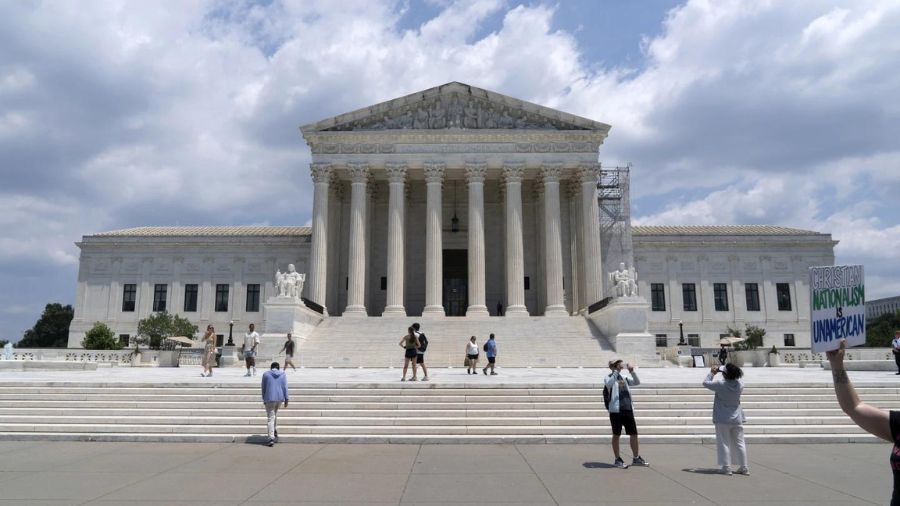Judge tosses lawsuit aimed at removing state’s gender-affirming care for youth
May 16, 2024, 2:21 PM

A young child holds a pair of trans pride flags at a noon gathering on the steps of the Mississippi Capitol in Jackson. (Photo: Rogelio V. Solis, AP)
(Photo: Rogelio V. Solis, AP)
A federal judge in Washington has dismissed a lawsuit brought by two anti-transgender groups challenging a state law. The law is aimed at providing shelter for teens seeking gender-affirming care or reproductive health services.
U.S. District Judge Robert J. Bryan threw out the lawsuit Wednesday filed by International Partners for Ethical Care Inc. and Advocates Protecting Children. The judge ruled that their claims lacked sufficient evidence of concrete harm.
The lawsuit targeted Senate Bill (SB) 5599, which permits shelters for homeless or runaway children and offers assistance in accessing gender-affirming treatments without parental notification.
Bryan emphasized that the plaintiffs failed to demonstrate how the law directly harmed them or their children, dismissing their allegations as speculative and conjectural.
The groups, along with ten unnamed parents, argued that SB 5599 violated parents’ constitutional rights to direct the care and upbringing of their children, as well as their religious freedoms, due process, free speech, and equal protection rights. They contended that the law coerced “gender-confused” youth into seeking treatment against parental objections and allowed the state to facilitate transitions without parental consent.
More news: Transgender employee suing Boeing for harassment, unsafe work environment
However, the state of Washington countered, saying the plaintiffs lacked standing, as none of them alleged that their children were seeking gender-affirming care, had run away or had been impacted by the law’s modified notification requirements. This argument ultimately swayed Bryan’s decision to dismiss the case.
SB 5599, enacted in 2022, expanded the circumstances under which shelters could refrain from notifying parents or guardians about a child’s whereabouts or activities.
In cases involving youth seeking reproductive healthcare or gender-affirming care, shelters are now permitted to delay parental notification if there is a compelling reason to do so, such as concerns about abuse or neglect if the parent is informed.
The decision underscores the ongoing legal battles surrounding transgender rights and parental authority.
Past rulings concerning gender-affirming care
In a historic move, the U.S. Supreme Court made its first foray into the contentious debate over gender-affirming care by ruling in April that Idaho can enforce its ban on providing puberty blockers or hormones to minors. The decision, which saw a 6-3 majority in favor of allowing enforcement, marks a significant milestone in the legal trajectory of transgender rights.
However, the court notably refrained from delving into the constitutionality of the ban, focusing instead on procedural matters and the scope of judicial authority.
Meanwhile, in Ohio, Franklin County Judge Michael Holbrook issued a temporary injunction, blocking the enforcement of a law set to ban gender-affirming care for minors and transgender girls’ participation in school sports. The judge’s decision cited concerns about the law’s compliance with legislative procedures and the requirement that state laws address a single issue, rather than bundling disparate measures together.
In another pivotal ruling, a federal appeals court in Virginia declared West Virginia’s ban on transgender girls participating in girls’ sports competitions to be in violation of the rights of one teen athlete. The decision allows 13-year-old Becky Pepper Jackson, who identifies as a girl, to continue competing on her school’s track and field teams.
However, the broader implications of the ruling remain uncertain, as Attorney General Patrick Morrisey affirmed that the ban remains in place for others, pending further legal proceedings.
Other politics: King County faces property tax hike to save public health clinics from closing
These legal developments come amid a broader trend of Republican-led efforts to pass state restrictions targeting transgender individuals. While the pace of legislative action has slowed compared to previous years, measures targeting transgender people continue to advance in state legislatures across the country.
In Tennessee, lawmakers recently approved a bill requiring public school employees to notify parents if their student identifies as transgender, adding to similar laws already in place in several states.
In Alabama, legislators are pushing forward with legislation to define gender based on reproductive systems rather than gender identity, reflecting ongoing efforts to codify narrow definitions of sex and gender into law.
KIRO Newsradio has asked representatives of the plaintiffs in the Washington case for comment and has not received a response.
Contributing: Geoff Mulvihill, The Associated Press
Matt Markovich is an analyst and reporter who often covers the state legislature and public policy for KIRO Newsradio. You can read more of Matt’s stories here. Follow him on X, formerly known as Twitter, or email him here.













